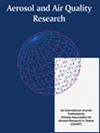Potential Risks of Open Waste Burning at the Household Level: A Case Study of Semarang, Indonesia
IF 2.5
4区 环境科学与生态学
Q3 ENVIRONMENTAL SCIENCES
引用次数: 0
Abstract
Open waste burning (OWB) is a common disposal practice in several countries. However, this activity can serve as a source of particulate matter and black carbon, which possess a greater greenhouse effect potential than CO 2 . Moreover, particulates can produce chronic health impacts on residents around the burning areas. Therefore, the present study aimed to examine the environmental effects and health risks associated with the open burning of household waste in Semarang, Indonesia. Four steps were followed to answer the research questions: (1) data collection through a random questionnaire survey, transect walk, and field survey; (2) estimation of environmental risk using the IPCC calculation method; (3) multiplication of emission factors to determine black carbon emissions; and (4) estimation of health risks based on chemical speciation bound to particulate matter. Open burning remained the second most common waste disposal practice even after the implementation of waste collection services by the government. Specifically, approximately 240.28 tons of waste is not collected by the environmental agency service every day, and 88.6% of the uncollected waste in the city is openly burned. Plastic burning contributed to the highest emission share among waste components, and annual total emissions due to OWB were estimated at approximately 53,809.66 tons. Although the carcinogenic risk was low, non-cancer disease risk exceeded the standard. Therefore, direct exposure of residents to OWB may pose significant health risks. The present work fills the scientific and knowledge gaps in the OWB studies.家庭层面露天焚烧垃圾的潜在风险:以印尼三宝垄为例
本文章由计算机程序翻译,如有差异,请以英文原文为准。
求助全文
约1分钟内获得全文
求助全文
来源期刊

Aerosol and Air Quality Research
ENVIRONMENTAL SCIENCES-
CiteScore
8.30
自引率
10.00%
发文量
163
审稿时长
3 months
期刊介绍:
The international journal of Aerosol and Air Quality Research (AAQR) covers all aspects of aerosol science and technology, atmospheric science and air quality related issues. It encompasses a multi-disciplinary field, including:
- Aerosol, air quality, atmospheric chemistry and global change;
- Air toxics (hazardous air pollutants (HAPs), persistent organic pollutants (POPs)) - Sources, control, transport and fate, human exposure;
- Nanoparticle and nanotechnology;
- Sources, combustion, thermal decomposition, emission, properties, behavior, formation, transport, deposition, measurement and analysis;
- Effects on the environments;
- Air quality and human health;
- Bioaerosols;
- Indoor air quality;
- Energy and air pollution;
- Pollution control technologies;
- Invention and improvement of sampling instruments and technologies;
- Optical/radiative properties and remote sensing;
- Carbon dioxide emission, capture, storage and utilization; novel methods for the reduction of carbon dioxide emission;
- Other topics related to aerosol and air quality.
 求助内容:
求助内容: 应助结果提醒方式:
应助结果提醒方式:


